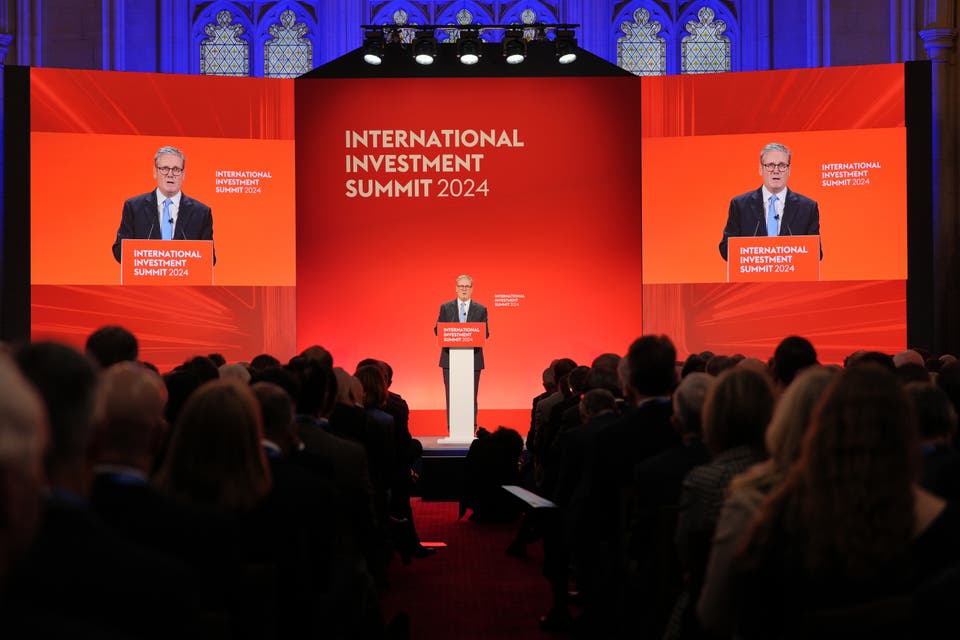Starmer pledges to ‘rip up the bureaucracy that blocks investment’

Prime Minister Sir Keir Starmer has said it is “time to upgrade the regulatory regime” as he pledged to “rip up” bureaucracy.
He said the Government will “make sure that every regulator” in the country takes growth “as seriously” as businesses.
He was speaking at the start of the International Investment Summit on Monday, which is expected to see the Government unveil deals in AI, life sciences and infrastructure.
It’s time to upgrade the regulatory regime, make it fit for the modern age, harness every opportunity available to Britain
Sir Keir Starmer
He told attendees: “It’s time to upgrade the regulatory regime, make it fit for the modern age, harness every opportunity available to Britain.
“We will rip up the bureaucracy that blocks investment. We will march through the institutions and make sure that every regulator in this country – especially our economic and competition regulators – take growth as seriously as this room does.”
He also said that businesses could share any “frustrations” with the Government, adding: “We’re united behind growth, our door is open.”
The summit comes following a bruising few weeks of headlines for the Government involving Number 10 turmoil and the freebies row, but the Prime Minister promised to “think in years” rather than “the days or hours of the news grid”.
In his keynote speech at Guildhall, he said: “We’ve got our problems, of course we have, as I’ve said our public services need urgent care, our public finances need the tough love of prudence – challenges we can’t ignore.
“Because we know, just as every leader here knows, that those early weeks and months are precious, and no matter how many people advise you to ignore it, that you must run towards the fire to put it out, not let it spread further.
“So, we will fix our public services, we will stabilise our economy, and we will do it quickly, because we don’t want any of the problems associated with our inheritance misting up the shop window of Britain, distracting you from all those assets that I just listed.”
He said it was “a mission-led mindset that thinks in years, not the days or hours of the news grid, needed to unlock potential”.
Earlier, Technology Secretary Peter Kyle said that “ripping out” bureaucracy to speed up innovation, would not lead to “cutting corners”.

Some have suggested that in order to make Britain a more attractive destination post-Brexit, the Government will need to regulate less than the EU.
Asked whether ministers would be open to doing so, Mr Kyle told BBC Radio 4’s Today programme: “Actually, I would say you need to regulate smartly and you need to regulate creatively.”
Asked whether he believed that was essentially the same as regulating less, he said: “It’s different. You don’t have to cut corners to get innovation through the regulatory landscape.”
Mr Kyle pointed to the Regulatory Innovation Office, which was announced last week and seeks to draw on the learnings of the Covid vaccine taskforce to expedite the deployment of new products, as an example of the Government’s approach.
“Not cutting corners or lowering standards, but making sure that the Government takes on some of the burden of compliance, so that our nation can benefit,” he insisted.
The Technology Secretary downplayed the prospect of concerns among traditional Labour supporters, including some within the trade union movement, over the Government “speaking the language of the Tories”.
He insisted there would be “high standards” for “everyone who invests and employs people in our country”, citing the recently introduced Employment Bill as an example of Labour’s commitment to workers’ rights.
The summit will see the Government pitch the UK as “open for business” as around 300 industry leaders worth an estimated £40 trillion in assets gather in London’s Guildhall on Monday.
In a joint letter to the Times that will be welcomed by the Prime Minister, businesses including JP Morgan and Goldman Sachs wrote on Monday: “We are optimistic about the future of the economy, and believe it is time to invest in Britain.”